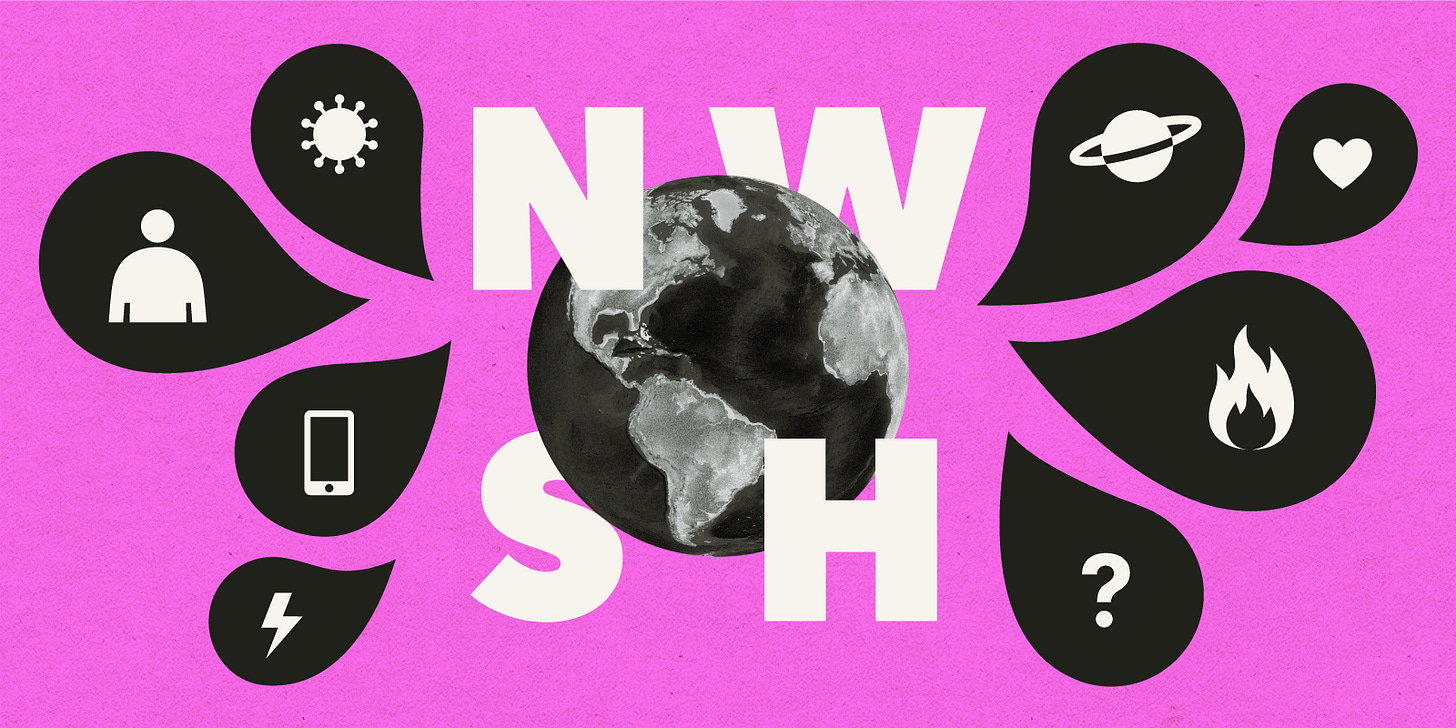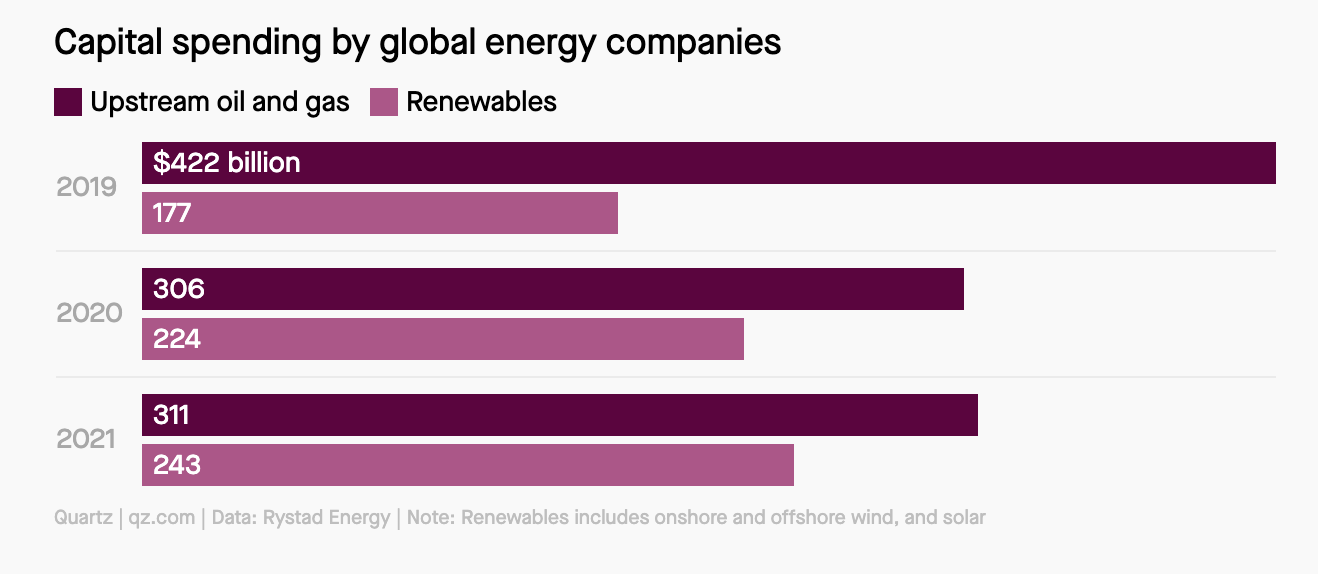New Week Same Humans #28
Bill Gates has a wild plan to cool planet Earth. The New York Times is freaking out about the creator economy. Plus more news and analysis from this week.
Welcome to the Wednesday update from New World Same Humans, a newsletter on trends, technology, and society by David Mattin.
If you’re reading this and you haven’t yet subscribed, then join 16,000+ curious souls on a journey to build a better shared future 🚀🔮
💡 This week’s Sunday essay argued for a new relationship between individuals, markets, and government. Go here to read There Is No Alternative.💡
This week, the storm clouds are gathering for Big Tech. The CEOs of Google, Facebook, and Twitter are all due before the US Congress on Thursday, and they’re going to get a bumpy ride. Is this the beginning of the end for unchecked platform power?
Meanwhile, Bill Gates has a ton of chalk dust and a big idea to delay climate change. And I get nostalgic about Apple’s OS X.
Let’s go!
⌛ The decline and fall of the platform empire
Three stories from the annals of Big Tech this week. First, guess how many Google searches end without the user ever leaving Google?
It’s two-thirds. That’s right, in 2020 64% of all search journeys that started on the Google homepage concluded without the user leaving Google. That’s according to new data from analytics firm SimilarWeb.
Worldwide, around 90% of searches take place on Google properties, which include YouTube. I’m guessing most searches that start on YouTube also end there.
It’s hard to see this as anything other than a natural monopoly. Profit margins in search are high. It’s a great business; if anyone else could get in, they would. As the media scholar Professor Jonathan Taplin says:
If you came to me and said ‘Hey, I want to start a company to compete with Google in search,’ I would say you’re out of your mind and don’t waste your energy… there’s just no way.
Also this week: Uber and Lyft drivers have claimed at least $80 million in government assistance during the pandemic, according to a new investigation by the Washington Post. Which is interesting given how hard Uber has worked to avoid classifying drivers as employees, and so to avoid paying into into unemployment insurance schemes for drivers. Essentially, Uber is outsourcing the costs of its workers to the tax payer.
Meanwhile, the CEOs of Facebook, Google and Twitter will appear before the US Congress on Thursday to testify on extremism and disinformation. Expect fireworks when the Zuck is in the hot seat and talk turns to Facebook’s role in the January Capitol riot.
⚡ NWSH Take: There’s something a little decline and fall of the Roman Empire about Big Tech right now. The power of the big platforms is at its peak. But cracks are starting to appear. // What’s at the heart of that feeling? Trump’s dark reign on Twitter, culminating in the Capitol riots, made the conversation about social media and its impact on our democracies unavoidable. Meanwhile the pandemic has pulled in two directions: embedding Big Tech dominance while reminding millions that when crisis strikes it’s governments, not Silicon Valley unicorns, that have their back. // But there’s another, less expected factor: the Biden presidency. Most expected Biden to govern as a centrist. But early signs are that he’ll be far more radical. Today Washington insiders Axios reported that Biden had a secret meeting with US historians recently, centred around ‘how big and how fast’ he can go to fundamentally change the US. The power of Big Tech is reportedly in his sights. Keep watching.
⛅ White sky thinking
Bill Gates has backed a plan to spray tons of chalk dust into the atmosphere in an effort to slow global warming.
The Harvard University scientists behind the idea say the chalk could reflect solar radiation and so help the planet cool. They’re planning a first test in June; a hot air ballon will fly 12km above the Swedish town of Kiruna, and spray 2kg of chalk dust into the stratosphere to measure its impact on solar heating of the Earth.
Private donors including Gates are putting up $30 million in funding.
Meanwhile, a new report by a coalition of NGOs says world’s biggest 60 banks have provided $3.8 trillion of financing for fossil fuel companies since the Paris climate deal in 2015.
But here’s one ray of light. New data shows energy companies are now investing almost as much into renewables, including solar and wind farms, as they are on finding new oil and gas. And the gap is narrowing fast.
⚡ NWSH Take: Critics of the Gates plan say spraying tons of chalk dust into the atmosphere may trigger a weird climate shock that we don’t understand. Hey, at least the Harvard scientists are going to run a small test before going all out. // Even Gates concedes it’s not a long-term solution. The idea is to buy ourselves 10 to 15 years of more moderate warming, while we squash carbon emissions to zero. // The best outcome here? It works, and we do squash emissions within 15 years. The worst? It works, and we use that as an excuse not to squash emissions. In other words: the risk of a runaway climate event is real, but so is the risk of a weird chalk skies addiction that stops us dealing with the underlying problem.
🍏 Emulate this
Mac OS X launched 20 years ago this week. For those too young to remember, it looked like this:
If you’re around my age, the picture above may trigger a longing for another game of Fussball in the college bar, or strange essay deadline anxiety. Ah, memories. I’m feeling particularly nostalgic for old computers and operating systems these days; I think it’s because back in the 90s and early 2000s it was still possible to believe, wholeheartedly, that personal computing was about to lead us to a New and Fully Democratised Wonderland.
Along with the iconic iMac G3, OS X marked the start of Apple’s turn around from drift and failure to the global titan we know today. Everyone loves a Steve Jobs product launch, so revisit simpler times and see how the Man Himself announced OS X.
📰 NYT to journos: make your choice
Yesterday, the NYTs told staff journalists to choose between traditional media and the creator economy.

The New York Times is yet to officially confirm. But given what’s happening right now, it’s not a surprising move.
⚡ NWSH Take: I wrote in last week’s instalment about the creator economy revolution ripping through traditional media, and how Facebook wants in. Part of that picture: big name journalists are leaving traditional publications for personal newsletters. // For star writers the economics are compelling: the political writer Matt Taibbi, for example, is estimated to earn over $700K a year via his paid Substack newsletter. Before going full time on the newsletter in April 2020 he worked at Rolling Stone magazine, where he is likely to have earned far less. // Now it seems the NYT is spooked; what’s to stop all its writers using the paper to build an audience, and then decamping to Substack to cash in? // The answer is: nothing. Well, now there’s this new rule. But that’s going to make it harder, over time, for the NYT to attract mid-career talent. An uneasy dance is only just beginning, as the new realities of the creator economy play out across journalism and other media.
🗓️ Also this week
🖐️ Facebook is working on a ‘neural wristband’ that will allow users to manipulate virtual objects in AR environments. The band will read electrical signals sent from the brain.
🚀 Elon Musk says SpaceX will land Starships on Mars ‘well before 2030’. Musk also urged the European Space Agency to be more ambitious with its Mars timeline.
🏠 A contemporary artist sold a virtual house as an NFT. Krista Kim sold Mars House for 288 ether, which is around $500K.
👗 Burberry created skins for characters inside China’s most popular video game. The designs were for Honor of Kings, a game so popular the CCP trialled facial recognition to limit how much time children can spend playing it.
💸 Microsoft may be about to buy messaging platform Discord for $10 billion. Analysts say the tech giant may integrate the platform, which is popular with gamers, with the Xbox ecosystem.
📺 Popular YouTuber Mr Beast is launching a $2 million fund to invest in new creators. The star, who has 55 million subscribers on YouTube, will offer $250K in exchange for a stake in the creator’s channel.
🤔 Amazon is asking delivery drivers to sign a ‘biometric consent form’. The form grants Amazon permission to use its new in-cab AI-fuelled cameras, which NWSH covered back in February.
💊 Pfizer is trialling a pill that could halt early-stage COVID illness. The pill contains a class of drug known as protease inhibitors, which stop viruses replicating.
🔭 The Event Horizon telescope has captured new images of a black hole. The images show the black hole in polarised light, and will enable scientists to learn more about how black holes suck in matter.
💡 NWSH joined the new social app Faves. After my announcement yesterday over 350 of you have joined the waitlist. See you inside the app soon!
🌍 Humans of Earth
Key metrics to help you keep track of Project Human.
🙋 Global population: 7,854,403,788
🌊 Earths currently needed: 1.7806937318
💉 Global population vaccinated: 1.4%
🗓️ 2021 progress bar: 23% complete
📖 On this day: On 24th March 1882 the German scientist Robert Koch announces the discovery of Mycobacterium tuberculosis, the bacterium responsible for tuberculosis.
New World OS
Thanks for reading this week.
Researching this week’s instalment brought me to the keynote that Steve Jobs gave for the launch of the iMac G3 in 1998. The machine had network capability, he said, because the internet was becoming more popular; some people were even using it at home!
No one really knew, then, the journey that lay ahead. Just as no one knows now where we’ll be in 2040.
What I can promise, though, is that New World Same Humans will be watching every step of the way.
This newsletter started out back in January 2020. Now it’s a community of 16,000 founders, researchers, marketers, designers, policy makers and more. There’s one thing you can do to make that community even stronger: share! If this instalment proved valuable, please take a minute to forward the email along to colleagues and friends you think will enjoy it. Or just hit the button below to share across one of your social networks:
I’ll be back on Sunday. Until then, be well,
David.
P.S Thanks to Monique van Dusseldorp for additional research and analysis.






